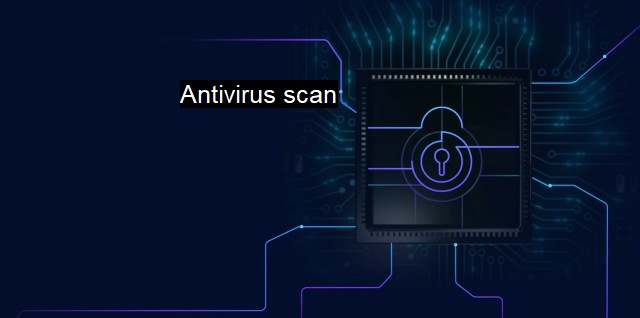What is Antivirus scan?
Securing your Digital Environment: Understanding the Significance of Antivirus Scans for Enhanced Cybersecurity
An antivirus scan refers to the method used by antivirus software to detect and eliminate any malicious software, commonly known as malware, from a computer device. In the domain of cybersecurity and antivirus, this process is deemed necessary as it provides a robust shield to the computer against potential cyber threats and hazards. It forms the crux of secure computing and performs the pivotal role of safeguarding the user's data.The term malware encompasses a variety of threats including viruses, Trojans, worms, spyware, adware, ransomware, and other malicious programs. These cyber threats are engineered to tamper with the normal operations of a computer, leading to significant and sometimes irreversible damage. They manipulate the user's data, compromise privacy, and can even lead to financial losses in case of sensitive or transactional data exposure. Hence, antivirus scan plays a critical role in digital safety.
Antivirus scans come in several types: Full, Quick, and Custom Scans. The full scan method conducts an extensive search throughout the computer’s memory: it explores every file, program and also checks all ongoing processes in the system. Despite being time-consuming, this method boasts its thorough examination and identification of potential malware.
On the other hand, a quick scan primarily scans the memory and auto-start processes and the system's registry, making it faster than the full scan. Although, it could leave your computer exposed to undetected malware located in other unscanned areas.
A custom scan, as the name indicates, allows users to specify the areas they wish to scan. This method is ideal when scanning individual or selected files, specific folders, or drives. Users can opt for this type of scanning when they suspect a particular area may be infected.
The scanning process begins with the antivirus software checking each file in the specified location against a database maintainer by the software provider called 'virus definitions'. These definitions contain unique identity codes of known malware and are updated regularly to counteract new threats. If a match is found, the file is either deleted, quarantined for further analysis, or an attempt is made to repair the file by removing the malware.
The success of an antivirus scan heavily relies on the virus definitions being up-to-date. Cybercriminals continually evolve their methods and create new malware, which imposes a requirement for constant updates of the database.
Some sophisticated antivirus software employs heuristic analysis besides the conventional matching method, enabling the identification of unknown threats or new strains of known malware. This procedure inspects code elements, analyses suspicious patterns, recognises code or instructions that misbehave, or strain themselves from known safe programs.
Possessing an antivirus software and conducting regular scans do not guarantee bulletproof security, as cybersecurity is a continually evolving battle. Users should avoid visiting suspicious websites, refrain from clicking, opening, or downloading uncertain files and emails, bolster their security-keeping software regularly updated, and practice stringent cybersecurity habits.
An antivirus scan works tirelessly in providing cybersecurity. It detects, restricts, and eliminates malicious software, which could prove severely damaging if left unchecked. Living in this digital age, an antivirus scan is indubitably an essential tool in ensuring smooth, efficient and secure working of computers and networks and securing the digital landscape.

Antivirus scan FAQs
What is an antivirus scan?
An antivirus scan is a process where an antivirus program searches your computer for any malicious software or code that may harm your system's security or data. The antivirus program goes through all your files and scans them for viruses and malware.Why do I need to run an antivirus scan?
Running an antivirus scan regularly is important because it helps protect your computer from cyber attacks, viruses, and malware. Cybercriminals are always looking for ways to breach your security and steal your information. By running an antivirus scan, you can detect and remove any threats that could compromise your system's security.How often should I run an antivirus scan?
It is recommended to run an antivirus scan at least once a week to ensure your computer remains protected from potential threats. However, if you frequently download files or visit risky websites, you may want to increase the frequency of your scans. Keep in mind that the more often you run a scan, the better your chances of catching an infection in its early stages.Can an antivirus scan slow down my computer?
Running an antivirus scan can slow down your computer temporarily. This is because the scan takes up system resources, such as CPU and RAM, to search for malicious software. However, most antivirus programs are designed to run in the background, so they shouldn't significantly impact your computer's performance. If you notice a significant slowdown, you may want to adjust your scan settings or schedule the scan for a time when you aren't using your computer.| | A | | | B | | | C | | | D | | | E | | | F | | | G | | | H | | | I | | | J | | | K | | | L | | | M | |
| | N | | | O | | | P | | | Q | | | R | | | S | | | T | | | U | | | V | | | W | | | X | | | Y | | | Z | |
| | 1 | | | 2 | | | 3 | | | 4 | | | 7 | | | 8 | | |||||||